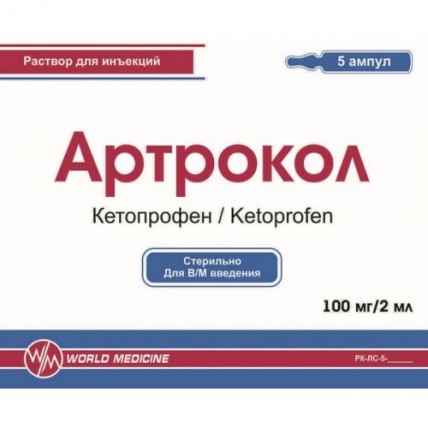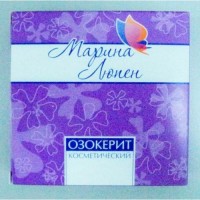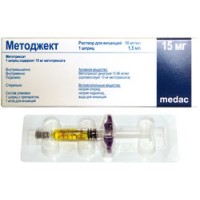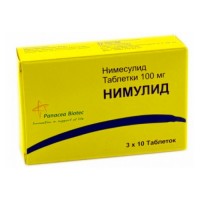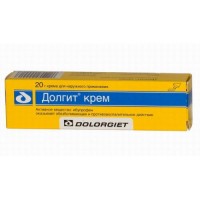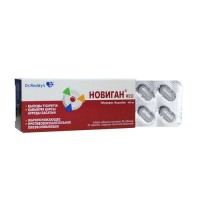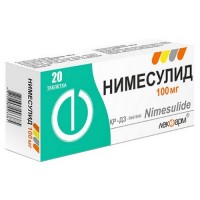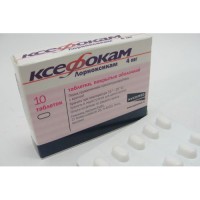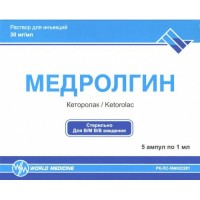Artrokol 100 mg / 2 ml 5's solution for injection in ampoules
- $17.20
The instruction for medical use of ARTROKOL medicine the Trade name Artrokol Mezhdunarodnoye the unlicensed name Ketoprofen Dosage Form Solution for injections of 100 mg / 2 ml, 2 ml Structure 1 ampoule of drug contains active agent - ketoprofen of 100 mg, excipients: arginine, citric acid monohydrate, benzyl alcohol, sodium hydroxide or acid chlorohydrogen, water for injections. Description Transparent colourless solution Pharmacotherapeutic group Non-steroidal anti-inflammatory drugs. Propionic acid Derivatives. Ketoprofen. The code of automatic telephone exchange M01AE03 the Pharmacological Pharmacokinetics Bioavailability properties makes 90%. The maximum concentration in blood is reached within 30 minutes. Extent of linking with proteins, generally with albumine, – 99%. The volume of distribution is 0.1 - 0.2 l/kg. Elimination half-life – about 2 hours. Ketoprofen quickly gets through a blood-brain barrier, into synovial fluid. Concentration of ketoprofen lower, than in blood, but is in synovial fluid more long time there that causes long effect of drug. It is brought out of an organism generally with urine (more than 50% in the form of metabolites), 1% is removed with a stake. A pharmacodynamics Artrokol – the non-steroidal anti-inflammatory drug derivative of propionic acid. Has analgeziruyushchy, anti-inflammatory and febrifugal effect. The mechanism of action is connected with oppression of activity of cyclooxygenase-1 and cyclooxygenase-2 and reduction of biosynthesis of prostaglandins which play a major role in pathogenesis of inflammation, pain and fever. The significant analgeziruyushchy effect of ketoprofen is caused by two mechanisms: peripheral - indirectly, through suppression of synthesis of prostaglandins, and the central, caused inhibition of synthesis of prostaglandins in the central and peripheral nervous system and also action on biological activity of other neurotropic substances playing a key role in release of mediators of pain in a spinal cord. Besides, ketoprofen has antibradikininovy activity, stabilizes lizosomalny membranes, causes considerable braking of activity of neutrophils in patients with a pseudorheumatism. Suppresses aggregation of thrombocytes. Indications Rheumatic diseases: - a pseudorheumatism - an ankylosing spondylitis - psoriasis arthritis - reactive arthritis - gout, a pseudogout - an osteoarthrosis - extraarticular rheumatism (a tendinitis, a bursitis, a shoulder capsulitis). Pain syndrome: - postoperative - posttraumatic - algodismenoreya, pains in metastases of tumors the Route of administration and doses Solution for intramuscular introduction. The drug is administered on 2 ml (100 mg) by 1-2 times a day. The maximum daily dose should not exceed 200 mg. Duration of treatment is defined by the doctor, it is not recommended to continue treatment by an injection form more than 2 days. Patients with a renal failure with clearance of creatinine have lower than 20 ml/min. and with a chronic disease of a liver (with the reduced level of albumine in blood serum) it is necessary to begin with a low dose of ketoprofen and to carry out the supporting treatment by a drug minimal effective dose. Side effects At assessment of frequency of emergence of different side reactions were used such gradation: 'very often' – of 10%, is 'frequent' – from of 1% to of 10%, 'infrequently' – from of 0.1% to of 1%, is 'rare' – from of 0.01% to of 0.1%, is 'very rare' – of 0.01%. Often: - dispeptic phenomena, loss of appetite, nausea, vomiting, meteorism, abdominal pains, constipation Infrequently: - diarrhea, gastritis - a headache, dizziness, drowsiness - skin rash - puffiness, pain and burning sensation in the place of an injection It is rare: - hemorrhagic anemia, a leukopenia - a depression, insomnia, nervousness, paresthesia - deterioration in sight - sonitus - stomatitis, ulcer of stomach and duodenum - hepatitis, increase in level of transaminases and bilirubin - increase in body weight - an acute anaphylaxis - a bronchospasm, an attack of bronchial asthma Very seldom: - exacerbation of colitis and Crohn's disease, gastrointestinal bleedings - an abnormal liver function - an acute renal failure, tubulointerstitsialny nephrite - a hypernatremia, a hyperpotassemia - an agranulocytosis, thrombocytopenia - spasms - heart failure - arterial hypertension - rhinitis - a photosensitization, a Quincke's edema, bullous rash, including Stephens-Johnson's syndrome, a toxic epidermal necrolysis of the Contraindication - individual hypersensitivity to ketoprofen, aspirin or any of drug excipients. Drug is also contraindicated in the following cases: - existence in the anamnesis of bronchial asthma, urticaria, rhinitis, a bronchospasm or reactions of allergic type after use of ketoprofen or similar active ingredients, such as other nesteroydny anti-inflammatory drugs (NPVP) or salicylates (acetylsalicylic acid) - heavy heart failure - treatment of pain the perioperatsionny period when performing operation of aortocoronary shunting (AKS) - a round ulcer in an active phase and also gastrointestinal bleeding, an ulcer or perforation in the anamnesis - gastrointestinal, cerebrovascular or other active bleedings - a chronic dipepsiya in the anamnesis - the significant disturbances of functions of kidneys - the significant disturbances of functions of a liver - predisposition to bleeding - disturbance of blood clotting or the current treatment by anticoagulants - disturbances from blood (a leukopenia, thrombocytopenia, disturbances of hemocoagulation) - pregnancy and the period of a lactation - children's age up to 15 years. Medicinal interactions Attention! Not to mix Artrokol, solution for injections and tramadol rolled into one in order to avoid precipitation. Artrokol it is not necessary to apply in combination with other non-steroidal anti-inflammatory drugs and salicylates. At the combined use with corticosteroids the risk of formation of ulcers and gastrointestinal bleeding increases. Anticoagulants (heparin and warfarin) and inhibitors of aggregation of thrombocytes (i.e. tiklopidin, klopidogrel) increase risk of developing of bleeding. If joint reception is inevitable, careful observation of the patient is necessary. Artrokol reduces efficiency hypotensive and diuretics. Risk of developing a renal failure is more at patients who accept diuretics, antihypertensives or APF inhibitors along with non-steroidal anti-inflammatory drugs. Potassium drugs, kaliysberegayushchy diuretics, APF inhibitors, heparins (low molecular weight or undivided on fraction), cyclosporine, takrolimus and Trimethoprimum at simultaneous use with non-steroidal anti-inflammatory drugs can promote emergence of a hyperpotassemia. Artrokol strengthens effect of oral glucose-lowering drugs and some anticonvulsants (Phenytoinum). Artrokol, as well as other non-steroidal anti-inflammatory drugs reduces removal and by that increases toxicity of cardiac glycosides, lithium, cyclosporine and a methotrexate. Non-steroidal anti-inflammatory drugs can reduce efficiency of mifepristone. Reception nonsteroid anti-inflammatory needs to be begun not earlier than in 8-12 days after mifepristone cancellation. At simultaneous use of cyclosporine with artrokoly the risk of toxic damage of kidneys increases. Use of a pentoksifillin and Artrokol increases risk of bleeding. It is necessary to control a bleeding time. Special instructions It is necessary to avoid simultaneous use of Artrokol of solution for injections with other non-steroidal anti-inflammatory drugs, including selection TsOG-2 inhibitors. With extra care patients should appoint drug with digestive tract diseases in the anamnesis (bleeding and perforation can suddenly develop without the previous symptoms). It is necessary to be careful also at the patients taking medicine which can increase risk of formation of ulcers or bleeding, such as corticosteroids of oral introduction, anticoagulants (for example warfarin), selective serotonin reuptake inhibitors or antiagregantny means (including acetylsalicylic acid). The risk of developing of gastrointestinal bleeding, formation or a perforation of ulcers increases with increase in doses of non-steroidal anti-inflammatory drugs. In such cases it is necessary to consider combination therapy with the drugs having protective effect on digestive tract (for example, mizoprostol or inhibitors of a protonew pomp). Patients with digestive tract diseases (especially to elderly people) should report to the attending physician about any abdominal manifestations. In case of developing of gastrointestinal bleeding or ulceration of digestive tract, it is necessary to stop treatment immediately. Careful observation of patients with arterial hypertension and/or stagnant heart failure as there are messages about development or strengthening of a delay of liquid in an organism during therapy by ketoprofen is necessary. During treatment, ketoprofen recommends monitoring of arterial blood pressure, especially at patients with cardiovascular diseases. Patients with uncontrollable arterial hypertension, acute and heavy chronic heart failure, coronary heart disease, diseases peripheral arteries and/or cerebrovascular diseases should carry out treatment by ketoprofen with care. Use of some non-steroidal anti-inflammatory drugs can be connected with risk of developing arterial thromboses (myocardial infarction, a stroke). Data for an exception of such risk for ketoprofen are not enough. At patients with asthma, with chronic rhinitis, chronic sinusitis and/or a nasal polipoz, emergence of allergic reactions is possible more often than at other patients. It is also necessary to be careful at patients with disturbances of a hemostasis, hemophilia, an angiohemophilia - Jürgens, heavy thrombocytopenia, a renal or liver failure and at those patients who accept anticoagulants (coumarin and derivatives of heparin, first of all heparins of low molecular weight). In an initiation of treatment it is necessary to carry out careful monitoring of renal function at patients with heart failure, cirrhosis and a nephrosis, at the patients accepting diuretics at patients with chronic kidney disease, especially if the patient at advanced age. Intake of ketoprofen can cause decrease in a renal blood-groove as a result of inhibition of prostaglandin in such patients and lead to a renal decompensation. If during treatment visual disturbances are observed, treatment should be stopped. Treatment by ketoprofen should be stopped before performing radical surgical interventions. Ketoprofen can be applied in combination with morphine derivatives if pain is serious. Intake of ketoprofen can worsen female fertility and is not recommended for women who want to become pregnant. This medicine contains ethanol of 12.3% (in / c). Each dose of 2 ml contains 0.2 g of ethanol. With care people of advanced age should appoint drug. Long courses of therapy by non-steroidal anti-inflammatory drugs, including ketoprofen, demand monitoring of hematologic indicators, indicators of function of a liver and kidneys, in particular from elderly patients and if the clearance of creatinine at the patient below 0:33 ml / with (20 ml/min.), is required ketoprofen dose adjustment. Use in pediatrics Safety and efficiency of use of the drug Artrokol for children is not established. Pregnancy and a lactation Use of drug in the I and II trimesters of pregnancy is possible only when the potential advantage for mother exceeds risk for a fruit. Artrokol's use in the III trimester and in the period of a lactation contraindicated. The feature of influence of medicine on ability to run the vehicle or potentially dangerous mechanisms At Artrokol's use should be careful at occupation potentially dangerous types of activity requiring special attention and speed of psychomotor reactions. Overdose Symptoms: headache, dizziness, somnolence, nausea and vomiting. Also there can be hypotension, weakening of breath and cyanosis. Treatment: there is no specific antidote, if necessary carry out symptomatic therapy. The form of release and packing On 2.0 ml of drug spill in ampoules from yellow glass. On 5 ampoules place in blister strip packaging. On 1 blister strip packaging together with the instruction for medical use in the state and Russian languages place in a cardboard pack. Storage conditions At a temperature are not higher 25ºС. To store out of children's reach! 3 years not to apply a period of storage after an expiration date. Prescription status According to the prescription the Producer "FarmaVizhn Sanayi ve A.Sh. Tidzharet", Turkey (Davutpasha Dzhaddesi No. 145, Topkapy / Istanbul) the Owner of a trademark and the certificate of registration is the company "UORLD of ILACh DIGNITY MEDICINE. VE TIDZh. A.Sh.", Turkey ("World Medicine Ilac San ve Tic A.S.", Turkey) the Address of the organization accepting in the territory of the Republic of Kazakhstan claims from consumers on quality of products of RK, Almaty, Turksibsky district, Suyunbaya Ave., 222b Ph. / fax: 8 (7272) 529090 The address of the organization responsible for post-registration observation of safety of medicine of TROKA-S PHARMA LLP acting through Toleuisheva Sandugash, Almaty, Suyunbaya Avenue 222-b Cellular ph. +7 701 786 33 98, (24-hour access).
To develop
To develop
